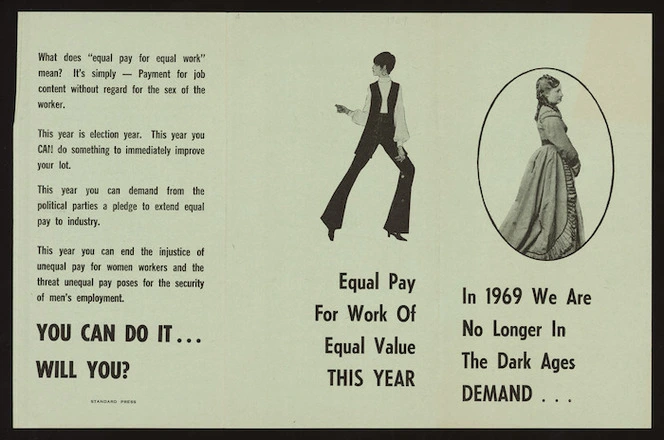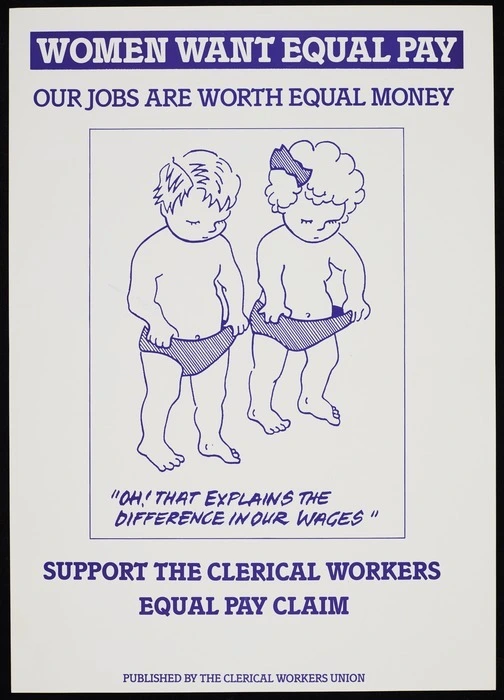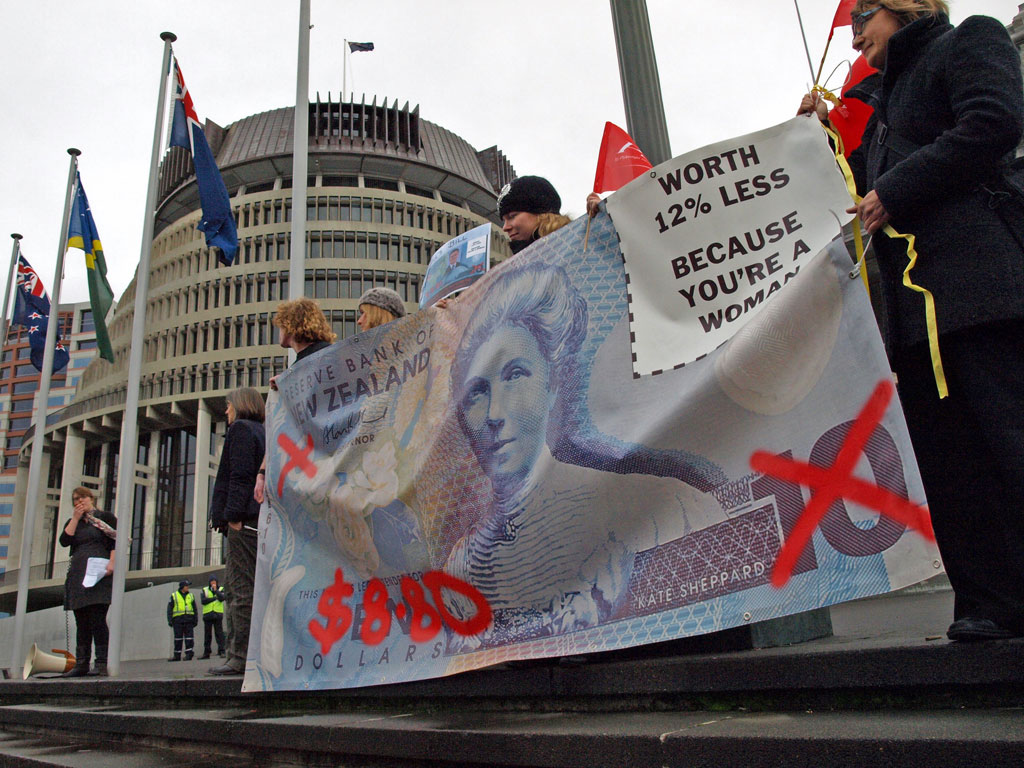Next month will mark 52 years since the Equal Pay Act was passed in Aotearoa New Zealand. For over a hundred years, unions have continued to work tirelessly in the pay equity space. Sometimes this work feels impossibly lofty - after more than half a century it's clear to many women that the most basic tenets of the Act have not been met. It pays, then, to reexamine the wins we've had to see how far we still have to go.
Early actions set the path for pay equity
One early fight for pay equity in New Zealand began after World War II with the Clerical Workers' Union. During the war, women working as clerical assistants had - as was the case in many industries - stepped up to fill vacancies left by men fighting abroad. When those men returned, these women, alongside their Union, asked to be paid at the same rate as their male counterparts - a fair ask, given they'd been doing the same job.
The response from employers was to create a new role with the title 'Office Assistant', which recognised the additional workload these women had taken on without giving them the corresponding pay. The obfuscating of a woman's job title when compared to a man doing the same tasks is a strategy still employed today, in current pay equity claims and makes it difficult to raise issues of pay equity through conventional routes.
Despite regular attempts from the Clerical Workers' Union to get equal pay awards through the Arbitration Court, it wasn't until 1960 that the Government Service Equal Pay Act was passed, and women working as clerical workers were paid fairly for a job they'd been doing for almost 20 years.
PSA stand up the Council for Equal Pay and Opportunity
Around the same time that this was going on, discontent around women's pay was bubbling up elsewhere in Aotearoa. By 1956, the Public Service Association had already for years been involved in disputes with government regarding the pay and promotion of its women members. As a result, that year PSA called for a meeting between women's organisations and trade unions to discuss forming a unified national body that could challenge the government on the issue of equal pay. Out of these discussions, the Council for Equal Pay and Opportunity (CEPO) was formed in 1957.
Throughout the late '50s and '60s CEPO organised talks, produced newsletters, issued press statements, and wrote to political parties in support of pay equity. Over a decade of pressure gave rise to the 1971 government Commission of Inquiry Into Equal Pay - the lone woman on that committee being a member of the CEPO executive, Miriam Dell. In 1972 the Equal Pay Act was finally passed and meant that - at least on paper - employers were bound by law to pay women the same rate as men for the same work.

Shortcomings of the Equal Pay Act
The Equal Pay Act, unfortunately, was not able to account for all the complexities of pay inequity. Under the legislation, individual pay equity claims had to go through the Arbitration Court, which was a lengthy and involved process. The sheer number of such claims meant that many were of the view that the Department of Labour simply didn't have the resources to police it. There was also the issue of the parameters by which 'unequal' pay was determined. What about women in female-dominated professions who, with no male counterparts to measure against, were unable to argue that they were being paid unfairly? The issue of work of 'equal value' was later clarified in court thanks to unionised workers' pressure and campaigning, and led to the current understanding of comparing work with similar value.
In 1974, 2 years after the EPA prohibited discrimination in pay on the basis of sex, female meat packers in Wellington were still being paid so-called 'women's wages'. There were few men in the industry, but comparing their own pay with the pay of men in similarly skilled work, the women found they should have been earning a rate 11% higher than what they were getting. This dispute was not covered by the protections of the EPA at that time, and so the Wellington Meat Packer Union (made up of predominantly young women) backed a 14-month strike of meat packers in supermarkets across Wellington, the Hutt, and Porirua. They were successful in their action - a notional male rate was written into the New Zealand Retail Butchers Award, and the meat packers were paid what a man would have made doing the same job.

The Struggle Continues
Struggles such as this have been undertaken by unions across the country over the last 52 years, contributing to ongoing demands for legislation aimed at strengthening the protections of the EPA - the 1990 Employment Equity Act, for instance, (which was instantly repealed by an incoming National government). The Equal Pay Amendment Act in 2020 codified the process for taking pay equity claims which show the undervaluation of women's work when compared with a 'hypothetical male'. Since this amendment, over 150,000 workers have had the inequity resolved by finally receiving on average 32% increases to their pay. This highlights the sheer extent of undervaluation of women's work. There are dozens of active claims in train, and many women still facing undervaluation.
Despite this, the overall wage gap for women in Aotearoa still sits at 8.9%. Although this is down from 19.1% in 2008, progress to be sure. But if it continues to close at this rate, we will not reach pay parity until 2055, 83 years after the Equal Pay Act was passed.
Outcomes are disproportionately worse for Māori, Pasifika, and disabled women. The rate of pay for Pasifika women when compared to their male counterparts, for instance, means that from 27 September 2024, until the end of the year they are essentially working for free. That's 95 days before the end of the year.
This is unacceptable. The effect that pay equity would have for working women is immense, and not on any abstracted or philosophical level. A 2019 survey done by PSA after the 2017 Care and Support Worker (Pay Equity) Settlement Act illuminated the way in which pay equity settlements can positively impact the lives of working women. When these women started getting the pay they were entitled to, it meant being able to, "go away for the weekend for the first time in seven years", to "buy [their] daughter clothes when she needs them", to "afford fresh fruit and veges: the difference between pay inequity and pay parity for these women was one which profoundly affected their ability to lead fulfilling lives.

It's clear, then, that there's a lot of work to be done in the pay equity space. The wins we've had so far did not come out of thin air, were not handed down by benevolent bosses or governments. It matters that the clerical workers, the meat packers, the care workers, and many others stood up, raised claims, and won. Not for their own interests, but because the protections they demanded have been passed down in solidarity to other working women, are now enshrined in legislation or embedded intangibly in working culture.
If we are to have further progress, it will be done in the same way. Every action, large and small, builds collectively for the working women of the future. This could be though big exciting events, sure, but it also starts now, with you - join and bolster your union, talk openly in the breakroom about what you and your peers are being paid help a friend look into raising a pay equity claim if she thinks she's being shafted. It's imperative that women being paid 100% of what they are worth is an issue impossible to take off the agenda - talk about it loudly, talk about it often.

Stella Whitfield
Communions Assist, NZCTU
Stella is a communications graduate from Te Herenga Waka Victoria University of Wellington. She has previously worked on the New Zealand International Film Festival, where she developed her copywriting and communication skills, and joined NZCTU Te Kauae Kaimahi in July to assist our comms team.






